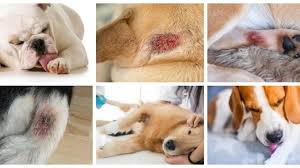Hot spots, also known as acute moist dermatitis, are a common and painful skin condition in dogs. Hot spots are localized areas of skin inflammation and infection, often characterized by redness, swelling, and moisture. They are typically caused by the dog’s excessive licking, biting, or scratching at a particular area. Hot spots can develop rapidly and become quite large, making timely treatment crucial.
These inflamed and infected areas can appear suddenly and spread quickly, causing significant discomfort to your pet. This comprehensive guide will cover the causes, symptoms, treatments, and preventive measures for hot spots in dogs, as well as answer frequently asked questions.
Causes of Hot Spots in Dogs:
Hot spots can be triggered by various factors, including:
- Allergies: Environmental, food, or flea allergies can cause itching, leading to hot spots.
- Insect Bites: Bites from fleas, ticks, or other insects can irritate the skin, prompting the dog to scratch and create a hot spot.
- Poor Grooming: Matted fur and poor hygiene can trap moisture and bacteria against the skin.
- Underlying Health Conditions: Conditions such as ear infections, anal gland issues, or arthritis can lead to excessive licking and hot spot development.
Clinical Signs of Hot Spots:
Early Signs:
- Redness and swelling
- Intense itching and scratching
- Moist, oozing sores
Advanced Signs:
- Hair loss around the affected area
- Thick, scabbed-over skin
- Foul odor from the infected site
- Pain and discomfort

Diagnosis and Treatment of Hot Spots:
Diagnosis:
- Physical Examination: A veterinarian will examine the affected area and assess the extent of the infection.
- Skin Scraping or Cytology: To identify any underlying bacterial or fungal infections.
- Allergy Testing: To determine if allergies are the root cause.
Treatment:
Cleaning the Affected Area:
- Shaving the Surrounding Fur: To allow air to reach the wound and prevent further irritation.
- Antiseptic Solutions: To clean and disinfect the area.
Medications:
- Topical Antibiotics or Steroids: To reduce inflammation and treat the infection.
- Oral Antibiotics: For severe or widespread infections.
- Anti-itch Medications: To alleviate itching and prevent further scratching.
Supportive Care:
- E-Collar (Elizabethan Collar): To prevent the dog from licking or scratching the hot spot.
- Hydration and Nutrition: Ensuring the dog is well-hydrated and receiving a balanced diet to support healing.
- To know about Feline Acne [Click Here]
Prevention Strategies:
Regular Grooming:
Frequent grooming helps maintain healthy skin and coat, reducing the risk of hot spots. Regular brushing prevents matting and removes dirt and debris.
Flea and Tick Control:
Using flea and tick preventatives helps prevent bites that can lead to hot spots. Ensure your dog is on a year-round flea control program.
Allergy Management:
Identifying and managing allergies can significantly reduce the incidence of hot spots. Consult your veterinarian for appropriate allergy testing and treatment.
Proper Hygiene:
Keep your dog’s living area clean and dry. Regularly wash bedding and ensure your dog is dry after baths or swimming.
Conclusion:
Hot spots are a common yet manageable condition in dogs. By understanding the causes, recognizing the symptoms, and implementing effective treatment and prevention strategies, you can help keep your dog comfortable and healthy. Always consult with a veterinarian for proper diagnosis and treatment to ensure the best outcome for your furry friend.
- For more details click here
FAQs :
Q1: Can hot spots spread to other pets?
A1: Hot spots themselves are not contagious, but the underlying causes such as fleas or allergies can affect other pets. It’s important to address these issues promptly.
Q2: How long does it take for a hot spot to heal?
A2: With appropriate treatment, hot spots can start to heal within a few days. Complete healing may take up to two weeks, depending on the severity.
Q3: Can hot spots recur?
A3: Yes, hot spots can recur if the underlying causes are not addressed. Regular grooming, allergy management, and flea control are crucial in preventing recurrences.
Q4: Are certain breeds more prone to hot spots?
A4: Breeds with dense or long coats, such as Golden Retrievers, Labrador Retrievers, and German Shepherds, are more prone to hot spots due to their fur trapping moisture and bacteria.
Q5: Can I treat hot spots at home?
A5: Mild hot spots can sometimes be managed at home with proper cleaning and over-the-counter treatments. However, it’s best to consult a veterinarian for proper diagnosis and treatment, especially for severe or persistent cases.

